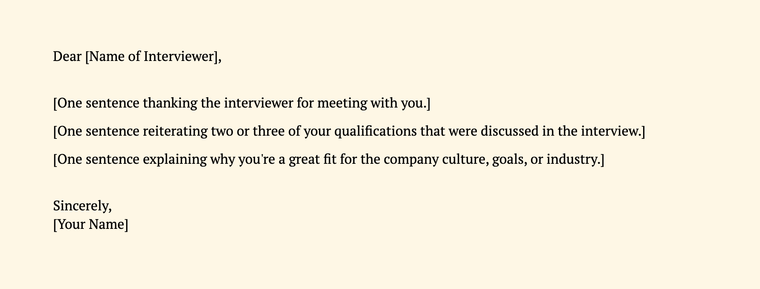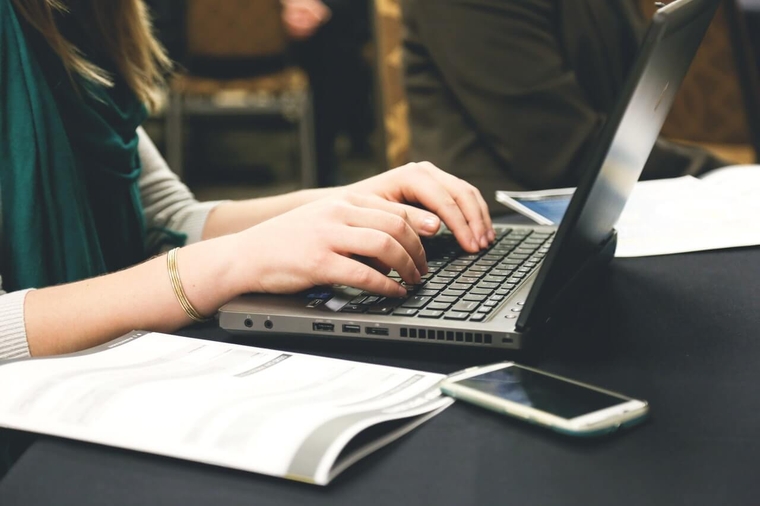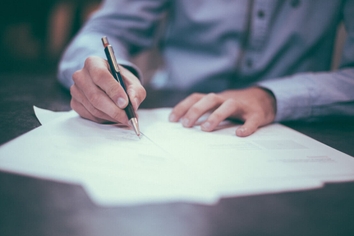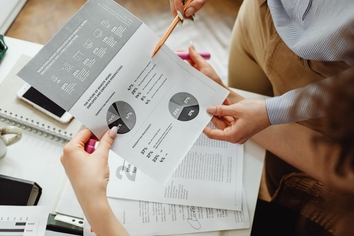
How to follow up after an interview: An Expert Guide for 2025

As soon as your first meeting with a potential employer is over, it’s time to start thinking about how to follow up after an interview. You might feel relieved that the interview is finished, but your work doesn’t end here. The interviewer hasn’t made their decision yet, and there is still lots of uncertainty.
Some people make the mistake of believing that once they leave a job interview, they can just sit back and wait for feedback. That isn’t the case. The hiring process is long, and even after the interview there is still plenty of work to do. You still have an opportunity to reach out to an employer and reinforce the idea that you're the ideal candidate for the role.
With that in mind, what should you do to follow up after the job interview, and when should you do it?
Recommended links:
- Our collection of 500+ professional resume examples.
- Our gallery of 20+ downloadable resume templates.
Always remember interview follow-up etiquette
Before getting into the specifics of what to do after your interview, it’s important to understand general business etiquette. Interviewers are busy, and you don’t want to distract them or waste their time.
In most companies, the person who interviews you doesn't spend all their time on recruitment. There might be a screening process with a human resources manager, but the interview itself will usually be with someone you'll work with directly should you get the job.
This means that they have other responsibilities at the company. The outcome of the interview might be the most critical thing in your world, but for them it's just another task on a never-ending list. It’s integral to your job search that you make the most of your time with them.
How and when you follow up is a balancing act. You need to make it clear that you’re enthusiastic about the opportunity, but if you pester managers or seem too desperate, you might undo all your hard work. Many employers use the interview not only to find out more about your skills and qualifications, but to build a mental picture of how you'd perform in the role should you get it. If you’re too pushy and annoying they might assume you would be the same when working alongside them.
No matter when or how you follow up, stay polite and professional in all communications. Your behaviour after the job interview should be just like your behaviour during the job interview: positive, conscientious, and competent. The interview and your follow-up email are opportunities for learning and growth, so even if the interview didn’t go well you should stay on-task and enthusiastic.
The days following the interview
You probably don't need much encouragement to stay focused on the job interview once it ends. It will be on your mind the rest of the day, if not longer. Capitalize on that energy, and take the next steps in the process while the interview is still fresh in your memory.
1. Write down important details from the interview
As soon as you leave the interview, write down anything important that came up. It will be easier to remember key topics and other highlights when the interview is still fresh in your mind.
For example, if the interviewer shared facts or insight on the company, make a note. If they asked a surprising question you hadn't prepared for, jot down the question and your answer for future reference. You might even think of some new questions or corrections as you take notes on the interview.
Besides helping you prepare for future interviews, these notes can help you write your follow-up email. You probably learned something new in the interview, either about yourself or the prospective employer, and that knowledge is important. Recalling the topics that came up in the interview shows that you were paying attention and can improve your thank-you note.
2. Send a follow up email soon after the interview
Your interviewer’s time is valuable, and they will appreciate your acknowledgement that they've spent some of it on you.
While looking for a job, you've probably had days where the entire process feels like a box-checking exercise. You find a job posting, adjust your resume, and submit it, feeling hopeless. Interviewers can feel the same way from the other side of the desk.
A follow-up message from you could brighten their day. To show that you appreciate their attention, write a thank you email shortly after the interview. Thank them for their time and refer back to what you discussed in the interview.
How to write a thank you email after an interview
A prompt thank-you email can make the difference between getting hired and getting rejected. You don’t need a ten-page review or an elaborate handwritten note. Your follow-up can be simple as:
Dear [Name of Interviewer],
[One sentence thanking the interviewer for meeting with you.]
[One sentence reiterating two or three of your qualifications that were discussed in the interview.]
[One sentence explaining why you're a great fit for the company culture, goals, or industry.]
Sincerely, [Your Name]

How long after an interview should you follow up?
Follow up right after the interview.
While it isn’t mandatory, sending your thank you email on the same day as the interview is good practice. This helps keep your name in the hiring manager’s mind and demonstrates a genuine interest in the job. It also shows that you value the opportunity and the time of others.
If you don’t send the thank-you email right away, the next day will do. Try not to wait longer than a week.
3. Recover from any mistakes
Not every interview goes perfectly. No matter how much you rehearse your answers and the amount of research you do, there's no way to predict what an interviewer will ask. You might get something wrong or stumble over your words.
As long as the interview wasn't a complete disaster, you can use your thank-you note or a separate follow-up email to recover from any mistakes. If you forgot something in the heat of the moment, fill in that gap in writing.
A willingness to admit mistakes and a desire to correct them are highly valued in the corporate world. With a great follow-up email, a mistake can be an opportunity rather than a deal-breaker.
How to write a follow-up email after an interview
Every interview is different, and that should be reflected in what you write. If you have a correction to make, or there was something said in the interview that you’d like to follow up on, you will have to bring it up in a natural way. With that said, it's always great to have a decent starting point:
Dear [Name of Interviewer],
[One sentence thanking them for their time.]
[A couple of sentences addressing anything that you would like to correct from the interview or new ideas you've had since thinking about it.]
[One or two sentences demonstrating your enthusiasm and outlining how much you're looking forward to hearing from them.]
Sincerely, [Your Name]
A follow-up email with a correction can still serve the same purposes as your initial thank you note. It keeps your name in the mix and demonstrates that you’re still thinking about the interview.
Writing a thank-you note is also a great way to reflect on the interview and consider what went well and what could have been better.
4. Check in with your recruiter
If you applied through a recruitment agency, were headhunted for a role, or were otherwise approached by a potential employer indirectly, it pays to maintain contact with them. They want you to get the job as much as you do, and they might have an existing relationship with your prospective employer.
The time may come when you can ask for feedback yourself but, in the interim, you can get a feel for how you performed by asking the recruiter if they have any insights.
5. Use the experience to grow your network
If you haven’t already, connect with your interviewers and anyone else you met at the company on LinkedIn. Even if they don’t end up hiring you, this is an opportunity to expand your professional network. One meeting or interview is more than enough to create a connection.
Send a personalized invitation, and take the opportunity to thank them once again for their time. This both keeps your name in their mind and broadens your network in your industry.
Don't worry too much if they don't immediately accept your request. They may not use LinkedIn very often. Besides, even if they never respond, there is no downside to sending the invitation.
6. Reflect on the interview and your performance
No matter what happens, every interview is a learning opportunity. Once you’ve sent a thank-you email, reflect on the application, the interview, the company, and everything you’ve learned throughout the process. Whether you get the job or not, it’s important to find ways to learn and improve every step of the way.
Most job-seekers attend dozens of interviews before they’re hired. If you want to land your dream job, you have to learn from each interview and consistently work to improve your job-searching skills. This one interview is by no means the end of your job-search process.
Be sure to reflect when the interview is still fresh in your mind. Think about how you performed and what you learned.
This is also a good time for an honest appraisal of the company. Is it what you expected? Do you still want to work there? Don’t feel trapped in this position just because you worked so hard to get the interview. You can always say no.

When you're waiting to hear back
Whether you aced the interview or humiliated yourself, waiting to hear back from the interviewer after you’ve sent a follow-up email can be agonizing. Don’t let your nerves prevent you from being productive in the days after an interview. Take these steps to make the most of your time after you follow up after a job interview:
1. Leave some time after a verbal deadline
It’s important to show enthusiasm for the position, but you don't want to seem like a nuisance. If the hiring manager offered a timeframe for when you can expect to hear back, give them a few extra days before you start to worry. For the employer, it's more like a guideline than a strict deadline.
If they told you that they would contact you within a week, don't set the alarm for precisely 168 hours from the end of the interview. Let a few more days pass before you reach out. Coming across as enthusiastic but not desperate is a balancing act, but an important one. If they said one week and you're reaching out after two, a reasonable employer will consider that fair.
Further, don’t send dozens of frantic emails if you don’t hear back. It can take several days before you hear back, even if you’re already past the original deadline.
2. Don't get complacent
Just because you performed well at an interview doesn’t mean the job is as good as yours. If you've been checking job boards and submitting applications, you should continue to do so. There’s no reason to put your job search on pause for a single interview.
This way, you’ll still have applications on the go if you don’t get hired. A single rejection won’t slow down your job search at all.
And if you do get the job, great! You can tell any other companies that respond to your applications that you're no longer interested.
3.Follow up on resources offered to you in the interview
Many companies have resources and documentation that they make available to new or prospective employees. As a result, it's not uncommon for hiring managers to say they'll send something over to you following the interview if it came up in conversation.
That might include brochures, product guides, contact information for someone else in the organization, or anything else they don't have on hand. This doesn't apply to every application, but if it applies to yours, remember to reach out and ask for the relevant resources. If nothing else, it's another chance to demonstrate interest and enthusiasm while getting your name in front of the interviewer.
If you're offered a second interview
In a perfect world, your interview would end with you being hired on the spot. Unfortunately, things rarely go that well in real life. Even if you make a great first impression, interviewers have many things to consider and other candidates to meet, so their decision isn’t going to be immediate.
In fact, most hiring processes will have more than one interview. Nearly all mid- to senior-level positions require two or more interview rounds. Even entry-level roles can require a technical interview. A second interview can be stressful, but it means you’re closer to getting the job than you were before.
1. Review your notes and previous research
The second interview could be weeks or even months after the first. Be sure to brush up on your knowledge of the role and the company. It’s important that you’re just as knowledgeable as you were the first time, if not more so.
You should also review your notes and revisit the topics that came up in the first interview. Those subjects may come up again, and you might return to questions that had been left open initially. If there was a topic or interview question from the first interview that you felt uncertain about, make sure you have a better answer to it now.
2. Prepare for a different kind of interview
Second interviews can be daunting, especially for those unaccustomed to them. The number of people you’re competing with is smaller, and the questions are sure to be harder. The second interview could also be a technical interview that directly tests your hard skills.
To prepare for the second interview, brush up on all of your technical skills and prepare answers for any common interview questions that didn’t come up in the first meeting. You should also review topics from the first interview and see if you can improve upon what you said the first time. Showing that you have grown since your first meeting could help.
3. Try to find out who'll attend the second interview
The second interview could be conducted by a different person. It could also be conducted by several new people. Now that you’ve made it past the first round of interviews, higher-ups and potential colleagues at the company could want to meet you.
You won't always be able to gather this information in time for the second interview, but knowing who you’ll be meeting with can be an advantage. Most people are on LinkedIn or Twitter, so there will be opportunities to expand your inline network.
Social media profiles can also help you discover their interests and specialties. If you can find interests that you share with your interviewers you can use them to your advantage and demonstrate just how good a fit you'll be.
4. Treat the second interview like a first interview
The second interview will be different from the first, but everything we mentioned previously about following up, staying polite and professional, and proactively thanking people for their time still holds true.
You can afford to be a little more nuanced in your follow-ups this time around, as you've already met some potential colleagues and you are much closer to getting the job. However, it’s still important to maintain proper etiquette.
If you don't get the job
Whether this is your first job interview or your hundredth, there are never any guarantees. No job is truly yours until it is. A rejection might get you down initially, but there's no need to dwell on it. There are plenty of other roles out there.
Even when you don’t get the job, any job application is a learning experience. There are always steps you can take to ensure the time spent in those interviews wasn’t wasted.
1. Thank the interviewer again
Always thank your interviewer. Even if you didn’t like them, and even if you think you should have been hired, it’s important to stay polite and professional. There's no point in burning bridges in the world of work.
Instead, you should adopt the viewpoint that you're not the right fit today but might be in the future. Ensuring that this relationship is a pleasant one and staying cool in the face of adversity is a good way to keep yourself in a prospective employer's good graces. You never know if you’ll cross paths with this company again.
2. Request feedback
You should always try to learn from your mistakes. If you can adopt the mindset that every experience is a learning experience, you'll complete the job-search process in far better shape than you started.
Learning from your mistakes is much easier to do if you know what those mistakes were. Interviewers will have the best insight into how you performed in an interview, so if you feel it’s appropriate you can ask your interviewer for feedback. They could have tips for performing well or specific feedback on your interview answers.
3. Express interest in future opportunities
If you didn’t get the job but still feel that you’re a great fit for the company, there’s no harm in expressing interest in future job openings. You may have been runner-up for this position, and could be at the top of the list for a similar role in the future. Let the hiring manager know that you’re still interested in this company, even though you didn’t land the job this time.
To do this, write a simple follow-up email:
Dear [Name of Interviewer],
[One sentence thanking them for the opportunity to speak with them and interview for the role.]
[One sentence saying that you remain enthusiastic about the company and would be happy to hear from them again in the future should a suitable role arise.]
Sincerely, [Your Name]
Make following up a habit
From entry-level roles to C-Level recruitment, getting the job of your dreams is a multi-stage process. The interview, while essential, is still part of a bigger picture. To make the best possible impression, it’s important to write a polite and professional follow-up email. Whether it’s the first interview or the last, you should always follow up.
How long should you wait after an interview to follow-up?
One should wait between 10-14 days before following up with the interviewer. Following up too soon can appear to be pushy.
How many times should you follow-up after an interview?
Try to limit your follow up emails to a maximum of two emails after an interview. Send an email after 8-10 days and a total of 2 emails over 15 days.
Is it bad to send a follow up email after an interview?
No, sending a follow-up email after an interview is not considered bad. An email that reiterates next steps or thanking the interviewer for their time is considered good.
How do you politely follow up after an interview?
To politely follow up after an interview you should thank the interviewer for the time, highlight a specific theme from the interview and express how excited you are about the next steps.
How to write a follow up email after a phone interview?
To write a follow-up email after a phone interview - write a short email that mentions an important, specific detail from the interview and thank the interview for the time they spent. Finally, mention that you are looking forward to the next steps.
Should I follow up 2 weeks after the interview?
If you haven’t already contacted the hiring manager yet, then do follow-up even after 2 weeks. Ideally, you should make sure that you follow-up with the interviewer between the 8-10th day.
Is it OK to send a second follow up email after an interview?
Sending a second follow-up email after an interview is acceptable if it has been at least a week since you last followed-up with the interviewer and haven’t heard back from them.
Is 2 days too soon to follow up after an interview?
Yes, 2 days is too soon to follow up after an interview. Consider waiting for another 5 days before you follow-up after an interview via an email or a call.
Is 3 days too soon to follow up after an interview?
3 days is too soon for you to follow up after an interview. Give the hiring manager another 4 days before you follow-up.
Is 4 days too soon to follow up after an interview?
Usually 4 days is too soon to follow-up after an interview. Give your hiring manager another 3 days before you follow-up.
When should you send a follow up email after the third interview?
Once you have had a third interview, make sure to follow within the next 4-5 days.
- Always remember interview follow-up etiquette
- The days following the interview
- When you're waiting to hear back
- If you're offered a second interview
- If you don't get the job
- Make following up a habit
- How long should you wait after an interview to follow-up?
- How many times should you follow-up after an interview?
- Is it bad to send a follow up email after an interview?
- How do you politely follow up after an interview?
- How to write a follow up email after a phone interview?
- Should I follow up 2 weeks after the interview?
- Is it OK to send a second follow up email after an interview?
- Is 2 days too soon to follow up after an interview?
- Is 3 days too soon to follow up after an interview?
- Is 4 days too soon to follow up after an interview?
- When should you send a follow up email after the third interview?

Written By
Madison Norton
VP Marketing & Resume Expert
Madison is the VP Marketing and General Manager at VisualCV. He's a seasoned marketing leader, resume writing and career marketing expert and now helping people grow their own career marketing strategies to build a career they love.

Over 50+ professional cover letter examples to include with your job application in 2025 - easy to create a custom cover letter for each application.
January 2, 2025
Read Post

VP Marketing & Resume Expert

The top hiring and human resource statistics for 2025, including data on AI resumes, job interviews, remote work, and recruiting.
January 1, 2025
Read Post

Community Success Manager & CV Writing Expert
![The complete guide to using a two-column resume template [with examples]](/static/944469b562e32c5bf7cab8359abbbcb6/b1ad1/laptops-pencil.png)
What is a two-column resume, and why should I use one? With stylish templates and efficient use of space, a two-column resume is great for any job-seeker.
April 22, 2022
Read Post

Community Success Manager & CV Writing Expert
Copyright ©2025 Workstory Inc.